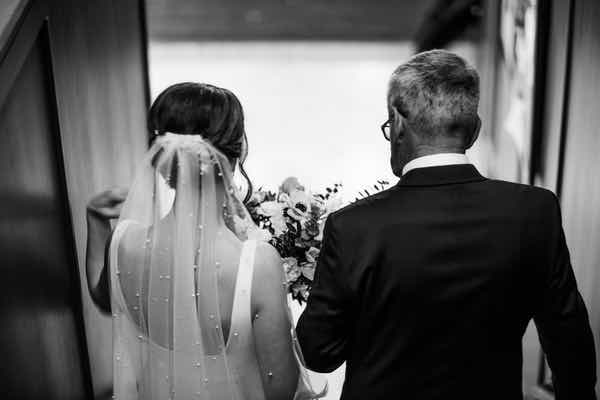
Wedding Etiquette & Advice From Industry Expert: What To Consider This Year
Wedding planning can be a minefield – especially navigating the politics of wedding etiquette when planning your big day.
Luckily we had a chance to sit down with industry expert Lisa Forde, who founded her wedding stationery business Tree of Hearts almost two decades ago and has seen it all. We’ve asked her to answer all your etiquette dilemmas.

Wedding industry expert, Lisa Forde
Lisa, one of the biggest questions we get asked is about budget…Should the happy couple stump up the costs, should parents chip in – or even pay for the day in its entirety?
There’s that big controversial issue that revolves around whether the parents of the bride are the ones to pay for the wedding, or should it be a joint effort from both sides. According to many traditional cultures, it’s indeed the parents of the bride who take care of paying for the wedding.
However, as couples get married later in life and as the average wedding today costs more than £30,000, we’ve discovered that most couples pay for their weddings by themselves. However, they do so mostly with a little help from their family, but not necessarily their parents. Here’s what Marth Stewart has to say about this.
For parents that do choose to contribute, it has been said that the bride’s parents contribute around 45 percent, whilst the groom’s parents contribute 15 percent. However, this will of course change from one wedding to the other. In many cases, there will be other family members who would actually want to chip in, like close aunts or grandparents. They will usually prefer to contribute to paying for a specific section of the wedding like the wedding stationery.
And should you offer a free bar for your guests?
This of course depends on the budget, and while it’s a great addition, it’s definitely not expected by guests.
On a similar note, what’s the best way to ask for cash in lieu of gifts at your wedding?
Many couples face the hard dilemma of how to politely ask for a Cash gift without sounding vulgar. The descent goal is just not to end up with undesirable gifts. This can definitely be a tricky conversation to have with friends or family.
Since most couples, these days live together before they say “I Do”, they usually already possess all the household tools that used to be popular wedding gifts. So if you’re going to ask for cash, think about what you are going to spend it on – we find the cost of the honeymoon is often covered, at least partially, this way. Your guests will definitely welcome this since they will have an idea of what they’re contributing.
Should the bride’s father still be ‘giving her away’ in 2022, and should she take her husband’s name – or are they outdated traditions that should be scrapped?
When you look back, these traditions are based on ancient Roman traditions and the days of arranged marriages. Back then, women were treated as property, so it represents the act of the father simply giving his daughter to a new owner – and obviously for the best price he could get.

Should the bride’s father still be ‘giving her away’? Photo by Taylor Gray on Unsplash.com
Naturally, today in the digital age, women aren’t regarded as property anymore, and there is no situation (at least in the Western world) for a Dad to ‘give’ his daughter to another person – and for sure not in return for money!
However, this is still a very common tradition 21st-century brides stand by. These days, it’s regarded more as a sign of respect for the Dad or a way to make them feel like a bigger part of the party.
One more comparable tradition that some 21st-century brides battle with is taking their partner’s surname, which also in this case – historically symbolizes the bride being given to a new owner.
Many new-age couples prefer to continue this tradition when buying their wedding stationery while others have adapted it to accompany their own needs. As an example, double-barrelling a surname to showcase the connection of two families or even mixing names together to create a completely new family name.
Lisa, let’s talk table plans and who’s on the top table? Must it be the parents?
Table plans are also regarded as one of the most annoying parts of wedding planning. You are tasked with ensuring that your guests are seated beside someone they know and more importantly – like. On top of that, you need to navigate the politics of who is on the ‘top table’ alongside you and your new husband or wife.
According to the old traditions, the table is reserved for the parents of the bride and groom together with the best man and the maid of honor. However, if you have stepparents and siblings, it could become tricky.
What we’re really seeing a huge increase in is what’s been dubbed a ‘sweetheart table’ – where it’s just the two of you. This approach disproves the need for any stiff discussions about who makes the cut and offers a joyous opportunity to actually spend some great one-on-one time with your new spouse on the greatest day of your life.
Ultimately, it’s your BIG day and it’s your decision. Who do you really want sitting beside you on the happiest day of your life? Check out these unique seating plans.
Looking for some more tips? Check out this video on how to do your wedding seating chart:
The new normal: Covid and weddings – do you ask guests to test?
No one wants to hear the words Covid and wedding in the same sentence – and we completely understand why our brides-to-be are anxious after the effects the pandemic has had on the industry for the last two years.
While restrictions have been lifted, and there are no laws in place for those organizing or attending weddings, we know that some engaged couples are considering asking guests to take a quick test just in order to be on the safe side.
Maybe you have elderly relatives or vulnerable family members at your wedding that you want to feel comfortable when mixing with others, so asking people to test may give them peace of mind.
However, you’ve got to be prepared if guests refuse to test themselves – and decide what to do if that’s the case…
What do you do if a BIG sports event or live TV Show conflicts with the day of your wedding?
As we all know, popular TV shows and huge sporting events often occur on Saturdays – as do weddings. So what do you do? Do you boycott the game or accept the fact that some of your guests will want to watch it?
If you and your partner are both football fans then you could embrace the fun and ask your venue for a screen to show the whole match? Maybe have some bubbles ready to toast the team and yourselves at the end too.
You can easily add lots of little footballing nods to your day, too. Maybe give out mini chocolate footballs as wedding favors, have your page boy in football boots, set up some kickabout games outside, and even play ‘Football’s Coming Home’ during your evening.
If you don’t want to have the match or TV show playing, you’ll still need to accept it’s happening. However, if it’s at the time of the wedding’s reception then you could appoint a member of your family to keep the room updated with the latest goals and scores.
And finally, who’s on the guestlist – do you invite partners of guests and their children?
Weddings are more expensive than ever and it’s led engaged couples to make difficult decisions when it comes to cutting costs – one being decisions on guests.
Micro weddings became incredibly popular during the pandemic but recently we’re noticing more and more couples opting to downsize their wedding list of guests.
One way of doing this is considering if you need to invite your friends’ partners who you’ve never met just because it’s wedding etiquette – and even their children.
These can lead to really difficult decisions and difficult conversations but it’s more and more common to receive an invite to the day with your partner and family joining you in the evening instead of the whole day event.



